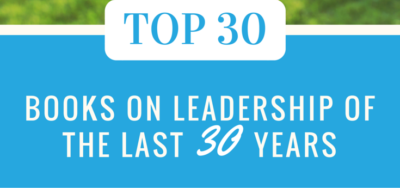
There are thousands of books out there on personal development, leadership and how to achieve business success. It can tiresome to wade through reviews to figure out which ones are worth your time.
Here we share our Top 30 leadership books of the last 30 years, why you should read them, and a powerful quote from each book.
1. The 5 Levels of Leadership: Proven Steps to Maximize Your Potential by John C. Maxwell (2013)
“At any level, a leader doesn’t automatically stay at that level. You must earn your level of leadership with each person, and that level can go up or down at any time.”
A list of top books on leadership would be lacking without any of Maxwell’s works. With more than 60 books under his name, Maxwell is an authority on the subject.
In this book, Maxwell provides a guide on how to develop your leadership skills through his 5 Levels of Leadership: Position, Permission, Production, People Development and Pinnacle.
Practical and humorous, this is a great read for anyone looking to take their leadership skills to the next level.
(Note: for this list, we didn’t include books already featured in our Top 5 Books For Team Leaders and Managers, which include 2 more John Maxwell titles)
2. Good to Great: Why Some Companies Make the Leap… and Some Don’t by Jim Collins (2001)
“The good-to-great leaders never wanted to become larger-than-life heroes. They never aspired to be put on a pedestal or become unreachable icons. They were seemingly ordinary people quietly producing extraordinary results.”
Jim Collins explores the factors that drive good companies to greatness. By profiling 11 companies that managed the jump to greatness, Collins shares strategies for how any company can reproduce that type of success.
3. Built to Last: Successful Habits of Visionary Companies by Jim Collins (1994)
“The test of a first-rate intelligence is the ability to hold two opposed ideas in the mind at the same time, and still retain the ability to function.”
Based on six years of research, this book examines 18 so-called “visionary” companies that were far ahead of their competition and the qualities that made them leaders in their respective industries. Built to Last provides insight into how leaders can build great companies.
4. The Innovator’s Dilemma: The Revolutionary Book that Will Change the Way You Do Business by Clayton M. Christensen (2011)
“To succeed consistently, good managers need to be skilled not just in choosing, training, and motivating the right people for the right job, but in choosing, building, and preparing the right organization for the job as well.”
Christensen examines how disruptive technologies can affect business success, and how companies can prepare for such changes. The Innovator’s Dilemma is great food for thought for high-level leaders who are looking to further build their companies.
5. The 7 Habits of Highly-Effective People: Powerful Lessons in Personal Change by Stephen Covey (1989)
“But until a person can say deeply and honestly, ‘I am what I am today because of the choices I made yesterday,’ that person cannot say, ‘I choose otherwise.’”
If you haven’t heard of this book, you’ve been living under a rock. Read by millions across the world, Covey shares the 7 habits that can lead you to positive change in both your professional and personal lives. A timeless book that should be read by anyone interested in personal development and leadership.
6. Primal Leadership: Learning to Lead with Emotional Intelligence by Daniel Goleman, Richard E. Boyatzis, Annie McKee (2004)
“The fundamental task of leaders… is to prime good feeling in those they lead. That occurs when a leader creates resonance a reservoir of positivity that unleashes the best in people. At its root, then, the primal job of leadership is emotional.”
This is the book that applied the concept of emotional intelligence to the business world. Goleman posits that outstanding leaders harness the power of emotional intelligence in order to produce results. He introduces the 4 qualities of emotional intelligence – self-awareness, self-management, social awareness and relationship management – that can help leaders better connect with their team.
7. Strengths Based Leadership: Great Leaders, Teams and Why People Follow by Tom Rath and Barrie Conchie (2009)
“What great leaders have in common is that each truly knows his or her strengths – and can call on the right strength at the right time.”
The traditional personal development book encourages people to work on their weaknesses; this book flips that idea on its head by suggesting that you should lean on your strengths and lead with them. Individuals don’t need to be well rounded; however, a great leader knows how to build a well-rounded team by leveraging on the strengths of individuals.
The book also comes with a unique code that gives you access to an online test to determine your strengths
8. On Becoming A Leader by Warren Bennis (1989)
“…leaders are people who are able to express themselves fully. By this I mean that they know who they are, what their strengths and weaknesses are, and how to fully deploy their strengths and compensate for their weaknesses. They also know what they want, why they want it, and how to communicate what they want to others, in order to gain their cooperation and support. Finally, they know how to achieve their goals. The key to full self-expression is understanding one’s self and the world, and the key to understanding is learning – from one’s own life and experience.”
A classic book on leadership, On Becoming A Leader promotes the idea that leadership is not intrinsic but something that one can learn and develop over time. According to Bennis, self-expression is the cornerstone of a good leader.
9. Lean In: Women, Work and the Will to Lead by Sheryl Sandberg (2013)
“Women need to shift from thinking ‘I’m not ready to do that’ to thinking ‘I want to do that — and I’ll learn by doing it.’”
Written by one of Fortune’s 50 Most Powerful Women in Business, this book is a must-read for all women in the corporate world. Filled with her own personal experiences, anecdotes and supported by data and research, Sandberg looks at the reasons behind the lack of women in top leadership positions and provides advice to empower women to develop their potential.
10. The Power of Framing: Creating the Language of Leadership by Gail T. Fairhurst (2010)
“Too often we believe that our organizational interactions are driven by logic and reason only. We either deny or fail to acknowledge the role of emotions in our framing when we ignore the way our bodies are registering pride, passion, joy, anger, and so on. Such emotions either accentuate our framing or provide a mixed message for those with whom we communicate.”
Want to improve your communication skills as a leader? Learn how to use the power of language to better communicate and persuade others. The book also provides tips on how leaders can manage meaning and create a shared reality as a frame of reference within teams.
11. The Leadership Challenge: How to Make Extraordinary Things Happen in Organizations by James M. Kouzes (1987, updated 2012)
“When leaders are doing their best, they Model the Way, Inspire a Shared Vision, Challenge the Process, Enable Others to Act, and Encourage the Heart.”
Often thought of as the best research-based book on leadership, this classic book has been updated for its 25th anniversary. With over 100 case studies that exemplify the Five Practices of Exemplary Leadership, this is an excellent book for leaders at all levels.
12. The Essential Drucker: The Best of Sixty Years of Peter Drucker’s Essential Writings on Management by Peter Drucker (2001)
“Intelligence, imagination, and knowledge are essential resources, but only effectiveness converts them into results.”
While much of Drucker’s work dates back more than 30 years, this ‘best of’ collection was published in 2001. Known as the father of business management, Drucker gives precise guidance on how to be an effective leader. If you’re new to leading a team, this is a fantastic starting point.
13. You Win in the Locker Room First: The 7 C’s to Build a Winning Team in Business, Sports, and Life by Jon Gordon (2015)
“After all, every team in the league has the same goals so it’s not your goals that will lead to your success but your commitment to the process, one game at a time, that will define your season.”
Do you love sports? This is the leadership book for you! Follow the trials and tribulations faced by NFL head coach of the Atlanta Falcons, Mike Smith, who was voted Coach of Year by his peers in 2008, 2010 and 2012.
The story of his journey – both successes and failures – provides the background to the 7Cs of Leadership that can be applied not just to sports teams, but business teams as well.
14. Leadership is An Art by Max De Pree (1989, updated 2004)
“The book is about the art of leadership: liberating people to do what is required of them in the most effective and humane way possible.”
Often described as an idealistic book, Leadership is An Art examines the “whys” of leadership and puts forward a more compassionate view of leadership that focuses on ethics and people development. Covering topics such as communication, leadership as stewardship and filled with personal anecdotes, De Pree’s philosophical view of leadership provides insight for anyone in a leadership position.
15. One Piece of Paper: The Simple Approach to Powerful, Personal Leadership by Mike Figliuolo (2011)
“…I invite you to embark on that journey of understanding who you are as a leader, who you want to be, and how you would like to get there. You are going to define your entire leadership philosophy—on one piece of paper.”
Can you define your personal leadership philosophy? And can you do it on one page? That’s the challenge posed by Figliuolo who believes that leadership is a quality that manifests differently for different people.
One Piece of Paper provides you with the guidance needed to assess your own brand of leadership and how you can articulate it to your team to maximize performance.
16. The Coaching Habit: Say Less, Ask More & Change the Way You Lead Forever by Michael Bungay Stanier (2016)
“Coaching should be a daily, informal act, not an occasional, formal ‘It’s Coaching Time!’ event.”
Are you a busy executive who has no time to coach your team? Stanier provides time-strapped leaders with a list of 7 questions to help them become better coaches by taking just 10 minutes out of their day. By building a coaching habit, leaders can guide their team members more effectively and create better results.
17. The Feiner Points of Leadership: The 50 Basic Laws That Will Make People Want to Perform Better for You by Michael Feiner (2005)
“Anything that an organization achieves is achieved by a group of people working together: At the simplest level, the leader is a leader because he or she can enable that group to deliver- and the only way to do this is through the relationships that define the group.”
Feiner draws on his experiences as the Chief People Officer at Pepsi-Cola Company and a management professor to provide a guide on resolving common leadership problems faced in the workplace. Whether it’s solutions on how to manage bosses or dealing with colleagues, this book is a practical How-To for all leaders.
18. The New One Minute Manager by Kenneth Blanchard (2015)
“Everyone is potential winner. Some people are disguised as losers. Don’t let their appearances fool you.”
This new version of The One Night Manager builds on the ideas introduced in the original published over 30 years ago, and updates it for today’s modern world. Great for first-time managers.
19. Winning with People: Discover the Principles That Work for You Every Time by John C Maxwell (2007)
“People knowledge is much more important than mere product knowledge.”
Having interpersonal skills is one of the key qualities of leadership. Want to learn how to be more of a “people person”? Maxwell provides 25 People Principles that can help improve your relationship with others. The great part is that you can apply this knowledge in all areas of your life, not just the office!
20. Team of Rivals: The Political Genius of Abraham Lincoln by Doris Kearns Goodwin (2005)
“His success in dealing with the strong egos of the men in his cabinet suggests that in the hands of a truly great politician the qualities we generally associate with decency and morality—kindness, sensitivity, compassion, honesty, and empathy—can also be impressive political resources.”
Selected by President Obama in 2008 as the one book he’d take to the White House if he could only choose one, Team of Rivals highlights the key qualities of Lincoln’s leadership, namely his ability to bring together people with different personalities and divergent viewpoints. This character study of Lincoln and his cabinet provides many insights on leadership and the power of harnessing the strengths of team members.
21. Drive: The Surprising Truth About What Motivates Us by Daniel H. Pink (2011)
“Human beings have an innate inner drive to be autonomous, self-determined, and connected to one another. And when that drive is liberated, people achieve more and live richer lives.”
What is the best way to motivate people? If your first answer is remuneration, this book will prove you wrong. With decades of human psychology research as evidence, Pink provides a persuasive argument that intrinsic motivation is the key to improving performance at the workplace. Learn how autonomy, mastery and purpose are the cornerstones of true motivation, and how to apply these concepts at the office.
22. Endurance: Shackleton’s Incredible Voyage by Alfred Lansing (1999)
“Of all their enemies — the cold, the ice, the sea — he feared none more than demoralization.”
The real-life survival tale of Ernest Shackleton and his crew of 27 men is not only inspiring and hair-raising, but also a brilliant story about the power of strong leadership and teamwork. Highly recommended for those who love adventure stories.
23. Wooden on Leadership: How to Create a Winning Organization by John Wooden (2005)
“Success is peace of mind which is a direct result of self-satisfaction in knowing you made the effort to become the best of which you are capable.”
Learn from coaching legend, John Wooden, as he shares insight and knowledge from his years of experience as a basketball coach. His “Pyramid of Success” is a great framework for leaders to adopt.
24. Influence: The Psychology of Persuasion by Robert C. Cialdini (1984, updated 2006)
“The truly gifted negotiator, then, is one whose initial position is exaggerated enough to allow for a series of concessions that will yield a desirable final offer from the opponent, yet is not so outlandish as to be seen as illegitimate from the start.”
Influence was first published a little more than 30 years ago, but we just couldn’t take this off the list! This is an excellent book that teaches you Cialdini’s six principles of persuasion so that you can exert more influence in various areas of your life. A dangerously good read.
25. Switch: How to Change Things When Change is Hard by Chip Heath and Dan Heath (2010)
“Change is hard because people wear themselves out. And that’s the second surprise about change: What looks like laziness is often exhaustion.”
Do you find it difficult dealing with change? Heath explains the psychology behind that feeling, and outlines strategies for dealing with the brain’s rational and emotional sides when faced with change. From personal change to organizational overhaul, the strategies in this book are backed up by plenty of real-life examples and inspiring stories.
26. Start With Why: How Great Leaders Inspire Everyone To Take Action by Simon Sinek (2009)
“If you hire people just because they can do a job, they’ll work for your money. But if you hire people who believe what you believe, they’ll work for you with blood and sweat and tears.”
You may have seen his TED talk about figuring out the importance of our jobs and what we do. This book expands on his ideas and takes them much further, delving into why some leaders are inspiring and lead change, while others falter.
27. Turn The Ship Around! by L. David Marquet (2013)
“Leadership should mean giving control rather than taking control and creating leaders rather than forging followers.”
Do you want to build leaders and not a culture of followers? This book by David Marquet relates his experience as a U.S. Navy captain and how he turned the USS Santa Fe into the best in the fleet.
Filled with insight on what motivates and inspires people, and how to empower every team member at each level, this is a great read that will help you strengthen your team’s morale and performance.
28. The Amazon Way: 14 Leadership Principles Behind the World’s Most Disruptive Company by John Rossman (2014)
“True collaboration is only possible in an atmosphere of trust. And that atmosphere is always set by a leader who has earned his team members’ trust and who trusts them in return.”
Get an inside look on how Amazon developed from a small start-up to a global retailer in only 20 years. Rossman outlines how Amazon’s company culture and focus on leadership helped propel it to success, and shares examples and anecdotes from his time with the company.
29. Purple Cow: Transform Your Business by Being Remarkable by Seth Godin (2002)
“In your career, even more than for a brand, being safe is risky. The path to lifetime job security is to be remarkable.”
Your business needs to be a Purple Cow! That’s the idea introduced by Godin, who argues for the necessity of standing out from the competition by Being Remarkable. A book that will inspire leaders to think outside the box and try new things.
30. Delivering Happiness: A Path of Profits, Passion, and Purpose by Tony Hsieh (2010)
“Happiness is really just about four things: perceived control, perceived progress, connectedness (number and depth of your relationships), and vision/meaning (being part of something bigger than yourself).”
Written by Zappos CEO, Tony Hsieh, this book outlines how having happiness as the basis of one’s company culture has led to success. His Happiness Framework provides a guide on how to find joyful meaning in both work and life.
Conclusion
That’s our list of the top 30 leadership books of the last 30 years. It should give you enough reading material for the next year!
Did we miss any? Let us know your favourites in the comments below.
Like this post? Pin it :)


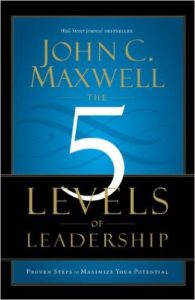
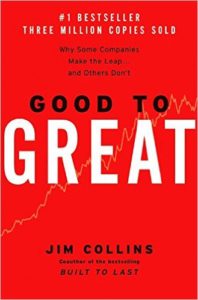
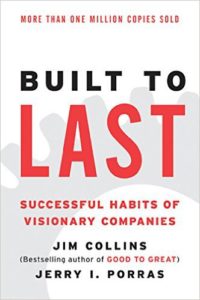
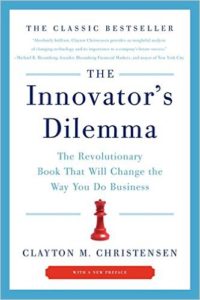
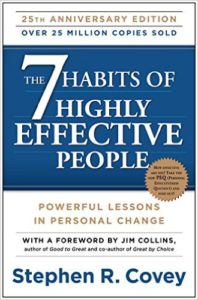
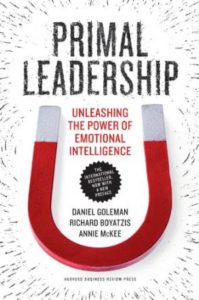
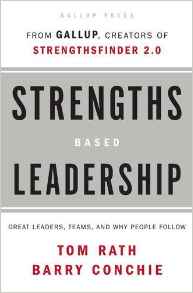
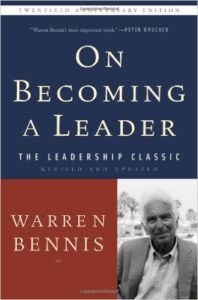

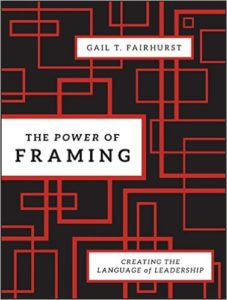
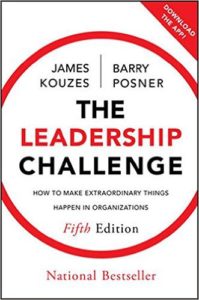
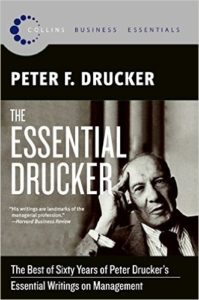
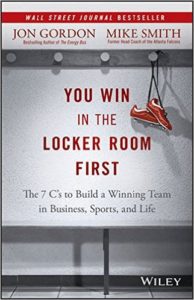
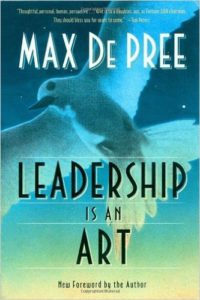
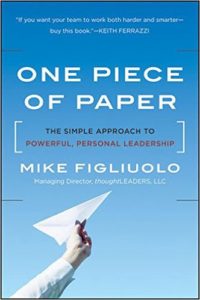
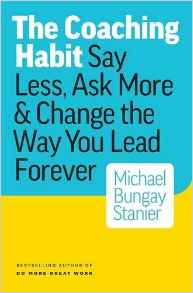


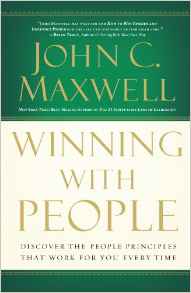
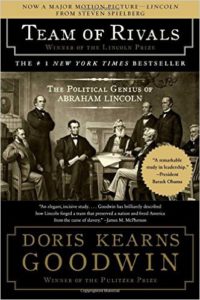
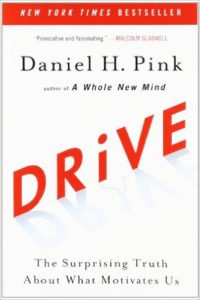

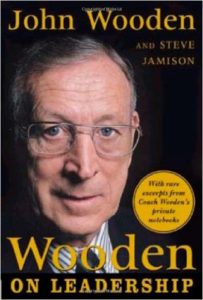
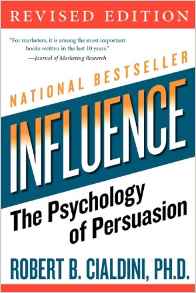

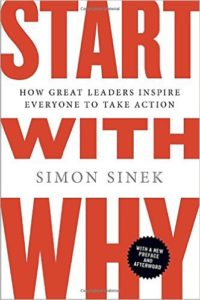
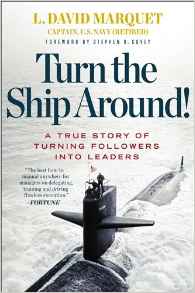
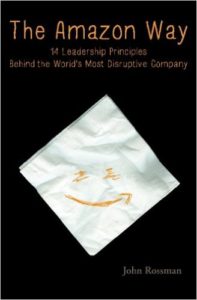
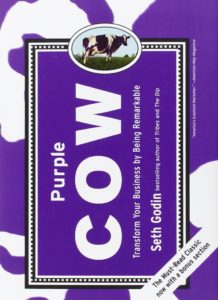


The top 30 leadership books of the last 30 years. It should give you enough reading material for the next year!
Plenty to learn and digest from these classic books.